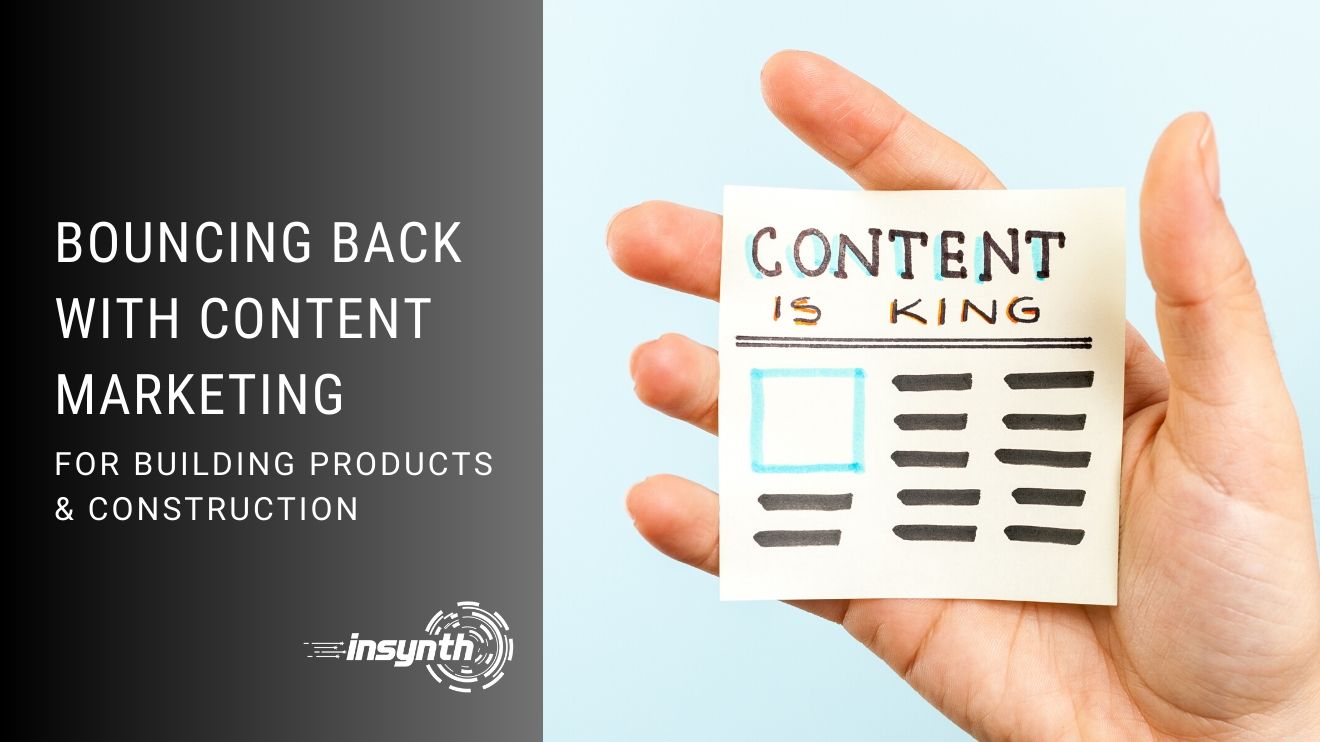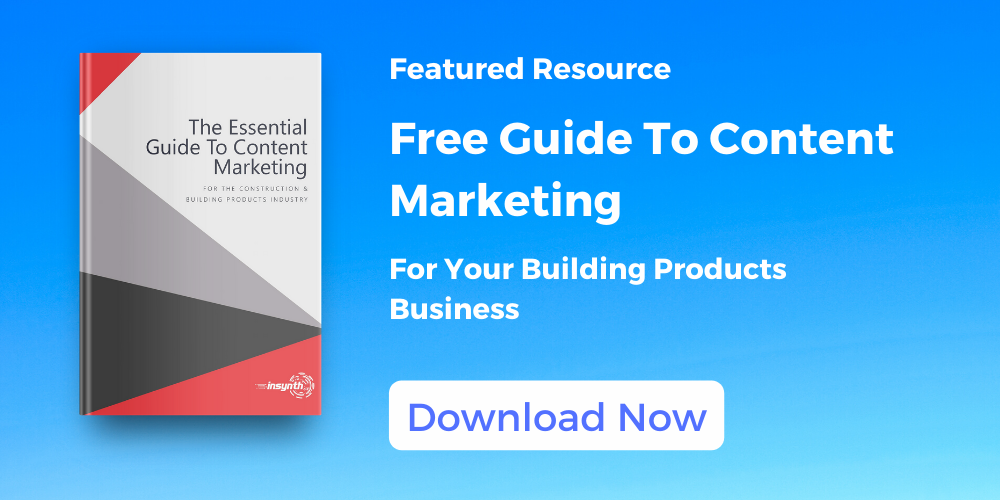
When searching on the Internet we all consume content without realising, our daily queries get answered by featured snippets, Q&A, forums, articles, and blogs.
However, when it comes to creating content for your building product brand, many companies fall short. This is partly down to time and skill, although people also struggle in knowing what to produce.
There’s no denying that content creation is a skill, but nothing is stopping you from learning the basics of how content marketing works and how it can help raise your profile online at a time when digital is the go-to place for research.
Content For Building Product Companies
The main aim of creating content is to help the specifier or architect and to educate them further about your product or service. This is not done in a sales fashion, instead, by helping people and sharing your expert knowledge, you become a thought leader within your space.
Chances are, you already have content on your website, it just isn’t being utilised or may not have been written in a way that educates. Types of content you typically find on a building products website include:
- Case studies
- Testimonials
- Datasheets
- Drawings
- BIM Drawings
- Installation Instructions
- Demonstration Videos
- Whitepapers
- Guides
- Industry Reports
- Blogs/News/Articles
- Certifications, Testing & Accreditations
Case studies are a great way to demonstrate how you work as a company and how you solve problems. They help your audience resonate as you deliver projects they can relate to. They’re a great content opportunity that many people don’t make the most off.
To create or improve a case study you already have take a look at our 10 step guide, you can also download a Case Study Cheat Sheet, a printable document to hand to your project team to get as much information as possible when the jobs being delivered.
There may be content that as a company you have, such as data sheets and drawings, but they might not be on the website. Your website is your 24 hours a day salesperson so it should have as much content as possible to help guide your prospect through the buyer’s journey. Holding back on useful content causes friction and frustration, people are impatient and will go elsewhere to find what they need now.
Bouncing Back With Blogging
Blogging is one of the most popular forms of content used on the internet, this is for several reasons.
It allows you to discuss your product, service or solution in detail without creating new pages on your website. They’re also great to promote on social and with a monthly newsletter to show you’re actively talking within your sector.
Having a blog allows you to show the personality, information and experience that distinguishes your business from your competitors.
The aim of writing a blog is to provide the reader with an experience they find useful and enjoy, so they come back again for more or even go on to enquire or download a guide. This then becomes a lead generation tool.
Now more than ever consultants, architects and business professionals are researching a topic or product solution by searching on the internet. If your website or blog doesn’t provide them with an answer to their query, chances are another company’s blog is.
You might be scratching your head thinking, what on earth could I blog about? And you’re right to question this, as many companies talk about themselves and their product in the wrong way.
Blogging shouldn’t be an opportunity to sell, but instead a chance to demonstrate your expert knowledge.
Therefore, although you can mention your solution or product, it’s done in a way that tries to help solve a problem.
How To Bounce Back Blogging Successfully For Building Product Companies
You want your blog to appear and rank highly in search so that when someone has a query about something to do with your solution, you’re there to help.
The best way to do this is by answering the questions you get asked the most. It sounds so simple, however, it’s a highly effective mentality that works.
Think about how you search queries in Google, most the time it’s in the shape of a question and you’re looking for an answer.
So, we advise using the questions as your blog titles, and your blog as the answers. Make sure you use keywords you want to be ranked for in the title and throughout the blog to increase your chances of ranking. Find out more about keywords here.
We recommend reading Marcus Sheridan’s ‘They Ask, You Answer’ if you want to fully embark in blogging for your company.
Conclusion
Having good quality content on your website is vital so when your prospects and visitors want to find out more and educate themselves, they can.
Think about the purpose of your website, until now you might have overlooked its importance and relied on the trade shows and your sales team reaching out to people to generate leads and get in front of people.
Now, more than ever people are unsure. Even the contacts you do have, not everyone is back to work, some might never be asked back to work, so you could be wasting your time chasing a dead end.
The internet (fortunately) is always running, your website is a constant tool you can rely on within your business, yet so many companies overlook its potential.
Having all your content and as much information as possible on your website is key to allowing people to decide by themselves, that they want to work with you.
The only problem is, with so many companies and businesses competing for the number 1 position on Google, your content needs to be strategically written for Google to not only find it but to recognise it as the best content.
To help you on your content creation journey, we’ve created an Essential Guide To Content Marketing, including all the tips and tricks to writing content that is not only read by people but Google too.
Having a website SEO optimised and built for converting your leads is a crucial part of your lead generation, although creating content is key, you need the foundations in place to ensure it succeeds. Below are a few links you might find useful:
- Content Marketing Tips for Building Products
- SEO In Construction Marketing: How To Create Content
- What Google Looks For When Ranking Your Website
- How To Use Free CRM Software To Bounce Back Smarter
- How To Bounce Back Using Social Media
- How To Bounce Back With The Right SEO Tactics
About Insynth
Insynth Marketing is a leading UK construction marketing agency based in Shifnal in the West Midlands.
They use the latest inbound marketing techniques such as construction inbound marketing, to support building product companies to grow their business by proactively driving sales lead generation activity.
As the only HubSpot certified agency to major on construction marketing, we bring together construction marketing strategy, digital strategy, website design, SEO, content marketing, email marketing, sales automation, marketing automation and HubSpot CRM implementation to produce successful campaigns and great results for our clients.

